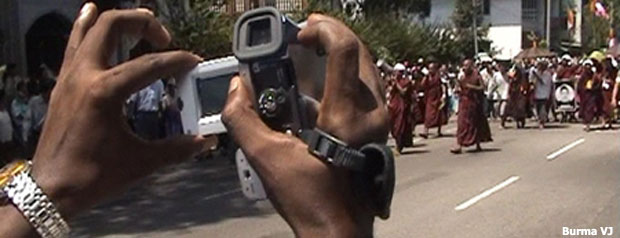ew Delhi (Mizzima) – A coalition of 12 freedom of the press groups on Friday urged the Burmese government to release journalists serving prison sentences. The coalition also urged the UN, the EU and Asean to put the Burmese government under pressure to stop oppressing journalists.
The coalition urged the Burmese government to release the detained journalists and provide the freedom of press.
Burma-VJ

“We called on the government to revoke the laws restricting freedom of press and the Internet. The “1964 Censorship Act” should be revoked. The Electronics Act, too,” said Zin Lin,
the vice chairman of Burma Media Association (BMA).
“Students’ leaders including Min Ko Naing have been sentenced to 15 years in prison for using e-mails. These are violations of human rights.”
The statement of the coalition also called on the Burmese government to release 17 video reporters from DVB including Sithu Zeyar and his father Maung Maung Zeyar, who have served eight years of a 13-year prison term.
Family members said that Sithu Zeyar was tortured and interrogated about the estimated 80 DVB reporters who work in Burma, according to the joint statement.
Twenty-three out of 1,994 political prisoners in Burma are journalists and most of them were charged under the Electronics act, according to the Thai-based Assistance Association for Political Prisoners-Burma.
The new Burmese censorship rules are divided into two categories: newspapers and magazines. Group 1 includes 82 journals and 96 magazines focusing on sports, health, arts, children’s literature, and technology, which don’t need to pass articles through censors prior to publication, but must submit copies after publication. Group 2 includes publications focusing on news, crimes, education, economics and religion, which must pass articles through censors prior to publication.
If a publication in Group 1 violates the rules three times, it must deposit 5 million kyat (US$ 6,250) with the censorship board and if the publication violates the regulations a fourth time, the money will be seized by the government.
“Although the government said that it relaxed censorship on some journals, the editors in Burma told me that the new policy was stricter,” said Zin Lin. “Some journals don’t need to pass articles through censors prior to publication, but the new policy leads to self-censorship by editors and publishers.”
Burmese President Thein Sein was included in a list of dictators and governments who imposed very strict censorship, the France-based Reporters Without Borders said.


